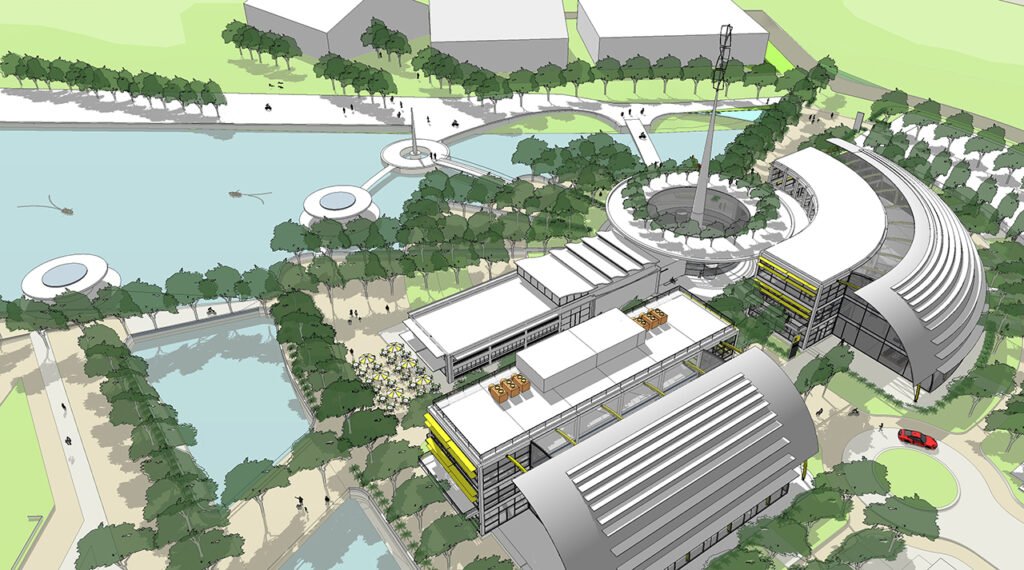NHDS

At Nick Hancock Design Studio (NHDS), we are passionate about developing projects that strive for net-zero energy and embrace forward-thinking approaches for a sustainable future. One concept that embodies this vision is the Eco Park—a pioneering project that showcases our commitment to symbiotic architecture and integrated master planning.
A Visionary Masterplan
The Eco Park was conceived in collaboration with Designscape as a mixed-use lakeside development in False Bay, South Africa. We aimed to create a vibrant community hub featuring workshops, laboratories, offices, greenhouses, and a substantial 1,500 sqm data centre. The vision centred on achieving a net-zero energy footprint while reusing existing structures, particularly the conference centre and lake, to enhance sustainability.
Symbiotic Architecture in Action
Central to the Eco Park’s design was the philosophy of symbiotic architecture. This innovative approach allows different facilities to collaborate, share resources, optimise energy use, and minimise waste. By placing data and energy centres at the core of Eco Park, we envisioned a self-sustaining ecosystem that harmoniously aligned energy generation with consumption.
Sustainable Energy Solutions
The data centre is a vital component of the Eco Park’s infrastructure, with energy requirements ranging from 100 to 500 kWh/sqm/year. The Eco Park could sustainably meet its energy needs by implementing solar panels and wind turbines. With optimal sunlight and wind conditions, we anticipated generating sufficient energy to power the data centre while providing excess energy for other on-site buildings.
Efficient Use of Natural Resources
Utilising natural resources was another hallmark of the Eco Park’s design. The adjacent lake provided an opportunity for passive cooling, reducing reliance on mechanical systems. This strategy ensured that buildings maintained comfortable temperatures with minimal energy use. Additionally, adaptive solar shading systems generated renewable energy and mitigated heat gain, further enhancing energy efficiency.
Water Management and Resilience
Sustainability extended beyond energy in the Eco Park. Our design incorporated rainwater and greywater recycling systems to capture and reuse water on-site. This commitment to resource management reduced reliance on municipal sources and supported the lush greenery characterising the Eco Park.
Harnessing Waste Heat for Agriculture
Innovatively, the Eco Park aimed to repurpose waste heat from the data centre. This captured heat could heat greenhouses, promoting year-round crop production while minimising energy waste. We highlighted how interconnected systems can drive sustainable practices by creating a synergy between the data centre and agricultural facilities.
The Role of the Energy Centre
The energy centre was pivotal in Eco Park’s master plan, optimising power generation from on-site renewable sources. By efficiently distributing energy across the development, the centre fostered collaboration among various uses, ensuring adequate energy consumption and production management.
Community Engagement and Technological Integration
Beyond its boundaries, the Eco Park sought to set an example for other communities. We demonstrated how technological advancements can support sustainable development by providing local digital infrastructure through the data centre—our holistic approach integrated community engagement and regional resources, enhancing resilience in urban environments.
Conclusion: A Blueprint for Sustainable Development
While the Eco Park was never realised, it is a testament to NHDS’s vision for a sustainable future. The principles of symbiotic architecture and innovative energy management outlined in this project serve as a guiding framework for future developments. By integrating energy and data centres into master plans, we can collaboratively reduce energy consumption and promote sustainability.
As we advance into an uncertain climate future, projects like the Eco Park illuminate the path toward a more sustainable and interconnected world. At NHDS, we are dedicated to turning these visionary ideas into reality, working toward a brighter, more sustainable tomorrow.
The Eco Park: Pioneering a Sustainable Future Through Innovative Design